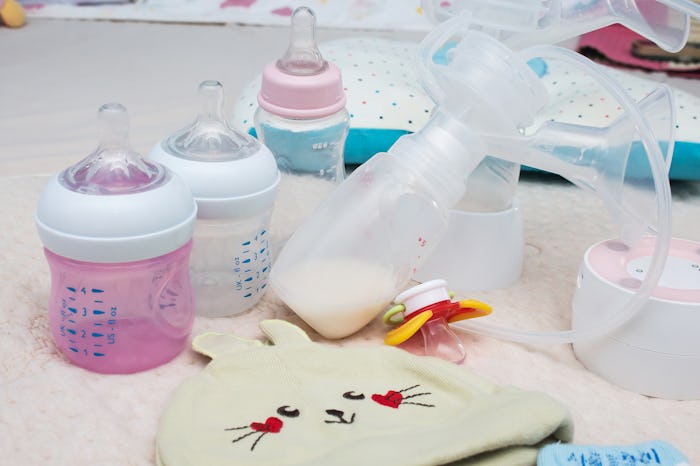Life

9 Things To Know About Power Pumping Before Trying It
Breastfeeding isn't always easy— it places a huge demand on your body, it takes up a lot of time, and it doesn't always work seamlessly for all moms. One of the biggest issues some women have is their milk supply. It can be tough producing enough milk to feed a growing baby, and some moms find themselves in desperate need of a few more ounces per day. For moms who need to boost their supply, power pumping can be a great option. There are a few important things to know about power pumping before trying it, but it can get you big results in a relatively short amount of time.
After about 10 months of breastfeeding my daughter, I started having trouble getting enough milk to meet her daily needs. My freezer stash was also running dangerously low, but I wasn't yet ready to start supplementing with formula— so I turned to power pumping. Although it was kind of a drag to be hooked up to my pump for so long every day, it did the trick and I got the boost I needed.
Here are nine key things to know about power pumping correctly and what it can do for your supply.
1You'll Need A Timer
According to Pregnancy, Birth and Beyond, power pumping works like this: set aside an hour, and then pump for 20 minutes, followed by a 10 minute rest. Then pump for 10 more minutes, and rest for 10 more. Then pump for one last 10 minute session. I recommend having a comfy pumping spot plus a book or a Netflix show cued up to help pass the time.
2You Should Pick A Certain Time Of Day
When I set out to power pump, many of my fellow pumping moms urged me to make sure that I pumped at approximately the same time every day. It seemed to help me, and I each day I would notice a bit more milk than the previous day.
3Morning Might Be Best
Due to my schedule, power pumping at night worked best for me. But many moms find that their milk supply is highest when they wake up, so if you can swing it, power pumping in the morning may be more productive according to Lansinoh.
4You'll Need To Commit A Few Days
Power pumping is not a one and done kind of thing. Lactation Services of Connecticut suggested power pumping for at least three days, even though a boost might kick in after two. I personally needed five to seven days to get my production high enough, so it may vary from mom to mom.
5It Mimics Cluster Feeding
According to Exclusive Pumping power pumping tricks your body into making more milk by imitating cluster feeding. A cluster feeding baby is constantly latching on the breast and trying to feed, which sends a signal to your body that more milk is needed. Power pumping can send your body that same message.
6You Could Get A Significant Boost
For me, power pumping produced about 25 percent more milk per day. It may not seem like a huge bump, but it was enough to cover an entire feeding for my daughter, so I was thrilled with the results. You may have even greater success— Fed Is Best noted that some moms report boosting their supply by 50 percent with power pumping.
7You Can Keep Using The Same Bottles
Power pumping may be very time consuming, but thankfully it's not much more work than a regular pump session. Low Milk Supply noted that moms can keep pumping into the same bottles throughout the entire hour, and there's no need to rush to throw the milk into fridge.
8You'll Still Need To Do Your Other Pumps
It would be kind of amazing if you could just power pump for an hour a day and then not have to worry about any other pumping or nursing sessions. But unfortunately, that's not how it works. The aforementioned Pregnancy, Birth and Beyond website noted that power pumping isn't a substitute for regularly emptying your breasts.
9It May Not Solve Your Problem
Power pumping won't necessarily work for all moms, unfortunately. That's why it's important to address the many possible causes of low milk supply, according to Kelly Mom. It's important to make sure your staying hydrated, getting enough calories, stay illness free, and get enough rest. It's also important to make sure your supply genuinely is low before you start stressing out about it. If your baby is gaining weight, seems satisfied after feeding and they're making enough wet and dirty diapers every day, they're probably getting all the milk they need.